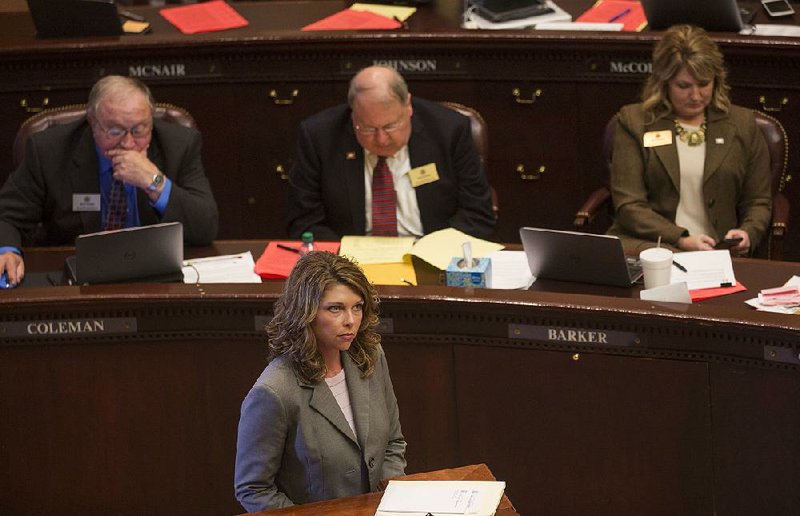A state lawmaker is planning a major rework to a bill that she wrote intending to protect the identities of confidential informants, but that free-press advocates said would keep many pieces of police investigations secret.
Rep. Michelle Gray, R-Melbourne, filed the bill Thursday and discussed it with the Arkansas Freedom of Information Task Force on Friday. All members of the task force and the public who spoke on the bill opposed it.
“What we’re trying to do is protect the identity of a confidential informant from the FOI,” Gray said.
But House Bill 1417 doesn’t set a timeline for eventual release of the information and says only that individuals who are “assisting a governmental entity,” or have “assisted a governmental entity” in a criminal investigation would be exempt from the state Freedom of Information Act.
Robert Steinbuch, a task force member and law professor, said the vague language could mean that the exemptions apply to all police investigations and include forensic evidence, among other things.
“This bill would be the biggest sea change since the FOIA’s inception,” said Steinbuch, who teaches at the University of Arkansas at Little Rock’s W. H. Bowen School of Law. He is also a co-author of the sixth edition of The Arkansas Freedom of Information Act reference book.
[RELATED: Complete Democrat-Gazette coverage of the Arkansas Legislature]
David Bailey, the managing editor of the Arkansas Democrat-Gazette, also spoke against the language in the bill, saying he hoped the Arkansas Press Association or members of the task force would be involved in helping amend it.
“I’m not really against the intent of this bill,” Bailey said. “I can’t imagine any right-thinking person would be.”
Gray said in a later interview that she planned to either amend the bill to make it more specific or write a fresh piece of legislation.
“After that task force meeting, I realized I think they were correct that the language was too broad,” she said.
Two other legislators also said after the meeting that they plan to amend their own open-records bills.
Sen. Kim Hammer, R-Benton, said he wants to make a couple of changes to his bill that would make private groups performing government functions, such as fundraising or labor, subject to the Freedom of Information Act.
The changes would remove a previous requirement that an agency spend 20 percent of its time, efforts or resources in support of a governmental function.
Hammer wanted other changes to Senate Bill 231, filed Jan. 31, to help keep donations by nonprofits private as long as they aren’t performing government functions.
“The intent of it [the bill] is to provide access to information that is shrouded or shielded,” Hammer said.
Rep. Jim Sorvillo, R-Little Rock, said he would amend House Bill 1382, which would keep the identities of lottery winners private. The bill was filed Tuesday.
“It’s dangerous if we find someone who wins a large jackpot,” Sorvillo said.
He said he wanted to set specific limits so that only those who win larger amounts of money would have their identities secret for security reasons and that people can sign a release so their names can be public.
A couple of task force members said they supported the bill, but representatives from the Arkansas Press Association and the Arkansas Democrat-Gazette spoke against it.
Aaron Sadler, the communications director for the Arkansas Press Association, said Sorvillo’s bill would hurt marketing efforts for the Arkansas Lottery and leave the system open to corruption.
“It’s very important, I would say, for transparency’s sake, for marketing’s sake,” Sadler said.
The names of lottery winners are currently public record.
